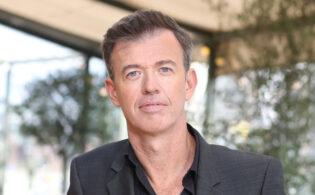PREMIUM: Banijay Rights CEO Tim Mutimer talks to World Screen about sourcing programming from Banijay Group’s 16 production entities around the world as well as from third parties and managing a catalog of 20,000 hours.
WS: What types of scripted shows is Banijay focusing on?
MUTIMER: Banijay is fortunate to have scripted companies in 16 territories, so we have a whole range of ideas coming through. We look at the slates and work with producers, especially on ideas that we think have international appeal. We’re interested in great stories that feel authentic. A lot of the series that travel well focus on local territories but are ones that people around the world can enjoy. There’s also a section of the slate that includes more premium content that requires a lot of funding. And there, we work out how we think we can fund a project—which other territories might be interested in coming on board and the kind of distribution advance that we could give. We’re interested in everything as long as it’s a great story, particularly if it means bringing on strong talent, whether that’s onscreen or behind the camera. Relationships with writers are important. We find that having these different production companies around the world enables us to engage with a wide range of talent, and makes sure we’re getting a great flow of ideas coming through.
WS: Is it getting more complicated to piece together financing for high-end drama?
MUTIMER: It is and it means that the distributor often has to take a greater risk. Commissioning broadcasters that once would have almost paid for the whole budget are now paying maybe 50 percent or 70 percent. So, it’s our job to find the rest of the money elsewhere. We look at tax incentives or co-productions. It’s a complex business. We’ve got a number of regular partners with whom we’ve got good relationships. The other advantage of being part of Banijay is that having companies in 16 territories means they’re trusted by their local broadcasters. We’ve got projects like [The Count of] Monte Cristo, that Neon Ink in London is developing. They’ve obtained paid development with a broadcaster in the U.K. We know it is a story that will resonate with French audiences. So Banijay Studios France has taken it to French broadcasters who have relationships with the creative talent at Banijay Studios and trust them to deliver a program that will work for their audiences just as well as it will for British audiences. It helps to be part of a group that has access to that expertise and those relationships.
WS: What opportunities have streaming services offered Banijay Rights?
MUTIMER: In terms of acquisitions, the streamers are key partners of ours; they are important clients. It’s interesting; we’ve started to see a switch in the way we work with companies like Netflix. Now they are focusing on fewer, bigger, better and they want fewer properties across a larger footprint. So the opportunity we have now is different. Rather than talk about everything as a patchwork of availabilities, it’s often getting in earlier and saying we’ve got this great new show coming. Is this something that would work for your service? And if they are interested, they are likely to want worldwide rights if they can get them. That’s a different operation and as a distributor, you have to decide if that is the right strategy for that property or not. It’s great that we have the chance to do deals like that and of course, we still have the option to sell on a territory by territory basis.
WS: If they take worldwide rights, can you sometimes keep second-window rights?
MUTIMER: No two deals are the same. Sometimes if they love a project, they will want exclusivity and if the deal is right, we can agree to that. Sometimes we can’t or won’t make the world available and they will be more flexible on the rights.
WS: And what if a terrestrial broadcaster wants exclusivity?
MUTIMER: It’s a matter of money and windowing. If they are prepared to pay for exclusivity, great. It will be fascinating to see what happens as all of the big conglomerates launch their proprietary streaming services. That is going to be a challenge for them, how much exclusivity do they want for their services—look at Netflix’s $100 million Friends deal. I’m sure the people launching WarnerMedia’s streaming service would have loved to have that show exclusively. But it’s such a valuable property you have to look at the numbers and decide if that is going to work; that’s what distributors do on a day-by-day basis. It could be that there are more opportunities for us if more of the U.S. studios decide to keep a greater portion of their inventory for their own services. There are so many platforms and broadcasters around the world who are hungry for content that this will bring more opportunities for independent distributors.
WS: Is there a willingness to share rights?
MUTIMER: I’m seeing a willingness to share rights, yes. Again, no two properties are the same, but we often window through OTT and public-service and commercial broadcasters around the world. We also work with regional OTT services. Movistar+ in Spain will launch Hierro at MIPTV and that is a great series with a rich, strong cast, including Candela Peña, who worked with Pedro Almodóvar. We work a lot with Viaplay. We’re launching Wisting with Carrie-Anne Moss. That is a great drama we have, thanks to a streaming service that commissioned it.
WS: What new formats will you be launching at MIPTV?
MUTIMER: We’re excited about Catch! from Banijay Group’s Brainpool for SAT.1 in Germany. It’s an explosive new entertainment format in which four teams of four players compete against each other in games inspired by variations on the timeless game of ‘catch’—ranging from the classic (cross the line, obstacle race), to the funny (blind catch) and downright scary (vertical catch). The fast-paced rounds see all the teams take on the parts of chasers and evaders. Each team is led by a celebrity captain and team members are top athletes and parkour specialists. We believe this has great potential for broadcasters as it can be scaled up or down depending on the clients’ needs.
WS: How have you been reimagining and launching some of your legacy formats like Temptation Island and Survivor?
MUTIMER: Survivor is an example of a format that’s been around 20 years and has been consistently on the air. We love it, we know it and the whole nub of Survivor is how people form societies together. And because it takes place in such extreme circumstances, it feels quite elevated. That is something that constantly engages, especially now as we watch what’s going on in our world! Survivor is one of the best formats ever. It’s going into its 38th season in the U.S. this year. Incredible. Julia [Dick, consultant executive producer at Castaway Television Productions] knows that format inside and out. She helps make sure it is a success wherever it goes. We are discussing a new version in Russia at the moment. She is talking to the production team there and knows what the potential risks are—if you do this it might be a bit boring, you have to do it that way. We’ve got the expertise and knowledge that give broadcasters real support to make sure the show is a success.
Temptation Island is interesting. It’s a huge hit that is still on air in places like the Netherlands, Italy, Belgium and has come back to the U.S. this year. Whereas once it was a honey trap for people, now the angle is more couples who feel they are at a crossroads in their relationship and want to test [whether or not they are] with the right partner. It’s become a social experiment but still fun and exciting and the casting is incredible.
WS: Careful what you wish for!
MUTIMER: Yes, and absolutely fascinating to watch. Shipwrecked is another format that is coming back in the U.K. It was on Channel 4 in the 2000s and it will air on E4. One of the things that makes these formats relevant and feel slightly different and fresh is that the production teams working on them are a whole new generation and see things through a slightly different lens. Social media wasn’t around then but is now and is a key part of the proposition. We’ve got producers just focusing on social media for Shipwrecked. And the cast is much more diverse than the cast was back some 20 years ago. So the show does feel fresh and of today.
WS: Do streaming services prefer scripted or do they also look for unscripted?
MUTIMER: We sell both. Scripted is more high-profile content. But Netflix and Amazon are commissioning more unscripted than previously. They will look at unscripted ideas and have acquired some from us. Yes, they buy both, but they do think of scripted first. But it’s cyclical as well. We talk about these great shows that are coming back that people can binge on. After I watched the first two episodes of Temptation Island, I couldn’t wait to see the third! Had it been on a streaming service it would be a weekend lost on Temptation Island!






